In 1965, Anna Simon’s parents moved from St. David’s, PA, into their newly renovated house at 209 Spruce Street, just two weeks before Anna was born. When Anna was about to arrive, a new neighbor, Peggy Davies, drove Anna’s mother to Bryn Mawr Hospital to have her baby.
Anna attended McCall’s School, Friends Select, and St. Peter’s School. In the second grade, she had a half year of school in Germany, where her mother’s family lived. This was intended to strengthen her mastery of German, which the family spoke at home. In the summers, the family would alternate visiting their relatives in Germany and going to their farm in Maine. After graduating from St. Peter’s, she attended the High School of Creative and Performing Arts. During one of the public school teachers’ strikes, Anna’s English teacher, who lived in the neighborhood, offered to tutor Anna so that Anna would not fall behind.
Anna talks about playing in the parks, on the lawn at Society Hill Towers, and in the parking lot behind the houses on Locust Street; riding bikes; and sledding on the hill at the Towers (always using a look-out for traffic). Anna was an ice skater, and she recalls taking public transportation to skate at the ice rink at the University of Pennsylvania and at the Wissahickon Skating Club in Chestnut Hill to practice speed skating. She talks about the winter after the Metropolitan Hospital at Third and Spruce had been torn down, leaving a large hole in the ground. She credits “Mr. Stevens and Mr. Putney” with creating a neighborhood outdoor ice rink. (Other narrators give the credit to other neighbors, but nobody disputes that the ice rink was uniformly popular.)
Anna describes virtually everything she experienced growing up in the neighborhood as fun. She has little criticism of it. Although she does acknowledge that there was some crime, she understands it is part of city living; and she learned, as the other third generation narrators did, street smarts.
Asked what she liked most about living in the city, she replies, “I liked that we could go anywhere we wanted.”
DS: This is an interview with Anna Simons. The date is February 5, 2010; the interviewer is Dorothy Stevens; the location is 116 Delancey Street in Philadelphia, PA.
DS: Anna, tell me again how you pronounce your name.
AS: Anna Simons.
DS: When were you born, Anna?
AS: I was born November 15, 1965.
DS: Were your parents living in Society Hill at the time?
AS: They had just moved there two weeks before, to 209 Spruce Street. They had moved from St. David’s with my sister, and I was actually late. I was supposed to be born in late October, and because of the move, I decided not to be born until they had moved in. At that point, my parents had all settled in, and I came along. Just before I was (1:00) born, my mom found a pink carnation, so she knew I was going to be a girl. She knew Peggy Davies, and when it was time, Peggy took us in her little VW; or it was ours, I don’t remember. Stuffed my sister, my mom, and Kert [Davies], and off we went to Bryn Mawr Hospital.
DS: Bryn Mawr?
AS: Yes.
DS: Where is it that you were living when you were born?
AS: Society Hill, 209 Spruce Street.
DS: Tell me about your siblings.
AS: I have an older sister, Simone, who is living in Germany right now, and she is, I believe, 49, and a younger brother, Andy, who lives in Virginia. [Inaudible] (2:00)
DS: Your older sister’s last name is?
AS: Oech.
DS: Where did you go to school?
AS: I started out at McCall, then went to Friends Select. In first grade we went to Germany for a few months to have schooling there, and when I came back – no, it was second grade – I had half a year of second grade in Germany – I started at St. Peter’s and graduated from there in eighth grade.
DS: Why Germany?
AS: Because my mom had family there, and she wanted us to get the language really incorporated into us, and that was a good age to do it. We already had the (3:00) language, but this was important.
DS: After St. Peter’s, where did you go?
AS: After St. Peter’s I went to the High School of Creative and Performing Arts, which was located then at Broad and Spruce Streets, in the old Atlantic building, on the sixteenth through eighteenth floors.
DS: How did you get to school?
AS: I walked. I could have taken the bus, but I walked, from Second and Spruce up [to Broad and Spruce, twelve blocks].
DS: That was your high school years?
AS: [Yes].
DS: Were your classmates mostly from the city?
AS: Yes, I don’t think I knew many from the suburbs. I think they were mostly city kids.
DS: [Inaudible]. Were there teachers’ strikes along the way in your education?
AS: Yes. In high school, during I think it was my junior or senior year, (4:00) the school district went on strike. I actually had the [good] fortune of knowing Mrs. Pritchett; she lives on Locust Street. She was my high school English teacher.
DS: That’s right behind you?
AS: That was right behind me. She came to me and said, “Anna, let me just tutor you while we’re on strike so you don’t fall behind.” I went every day for a few hours and we did English and a whole bunch of other stuff, and I didn’t fall behind. That was really nice that she did that.
DS: Your family, did they attend religious ceremonies or services?
AS: I think people know who Bertha von Moschzisker was. She was my godmother. She insisted that we go to Christ Church with my mom, and [that] we would go to (5:00) Sunday school. My mom was, “OK, we’ll do that.” We went for a few years, and I distinctly remember the church was beautiful. I don’t remember much about what happened there, but Sunday school I did. My sister got promoted. We were in the same class; she got promoted and I didn’t. I got furious. I said, “Do I have to go back? I’m not moving.” My mom said, “Do you really want to go?” I’m like, “No.” She says, “OK, you don’t have to.” That kind of ended it there. My mom read a German children’s Bible to us when we were younger, and we always believed God was in our hearts. We knew where we stood. We understood good from bad and that kind of thing, but we didn’t have to go to church on Sundays any more. I think we (6:00) were all relieved, because we weren’t used to it.
DS: Where did you play?
AS: All around the neighborhood. Actually, as I’m looking out your window, there are those buildings, and that used to be a field when I was little.
DS: What buildings?
AS: The buildings right here on Delancey Street.
DS: Oh, Penn’s Landing Square.
AS: I remember playing there. I remember playing behind my house on Spruce Street, on Locust. There used to be a field there, before they built those houses. I remember when they built those houses; I was devastated because – I cried and cried – and my mom finally asked me why and I said, “Because all the crickets are going to get killed.” I could hear them at night when I went to sleep, and I couldn’t hear them anymore. We also played up by the Towers, on their fields.
We went sledding there. (7:00) It was the best sledding. We would go down the hill. We always had some lookouts, because we went into the street, because you couldn’t stop. We had lookouts for cars and no cars. No one got hurt; that was a lot of fun. We also played in the neighborhood, in the school yards. Three Bears Park was our favorite. I think we wore out the slide once at one point, the Fiberglas twirly slide. There was a huge hole from rubbing in one place over and over again. The jungle gyms were all metal. We would just play. I don’t remember there being any soft material underneath. We did a lot of roller skating in the neighborhood, wall ball, hide and go seek, kick the can. When they built the buildings [houses along the south side of Locust Street], there were a lot of children around, so we played (8:00) in their driveways. It was secluded in the back.
DS: Where are we now?
AS: On Locust Street between Second and Third. There was a private entrance for cars to come in, so people could park behind their houses. We could play back there.
DS: It’s a parking lot?
AS: Yes. Great hiding places. We could hide in people’s gardens. It was fun. We played everywhere.
DS: Was that open at that point? It has gates on it now.
AS: It was open. The adults were really cool about it. They knew [we played there] so they would always come down very slowly and understood that we would be playing back there. Everyone looked out for each other. The adults looked out for the children, that we were all safe, that nothing was ever happening. We never felt like anything was going to happen to us. We would do funky things. Once there (9:00) was a huge rain storm, and my brother and I decided we wanted to know how to fly. We went up to the Towers with our raincoats on, and we decided to open them and see if we could catch a wind and run and jump. We would go a few feet. We thought it was the best thing. We were soaked by the end of it. Along the field, the wind was so powerful that it carried us over. We were like thrilled, “Yay, we’re flying!” We would bike ride around the neighborhood. My mom would take us down to what is now Penn’s Landing. It used to not be there.
DS: On the river?
AS: By the river. You couldn’t walk down there. The cars were zooming by. There were no traffic lights. Nothing.
DS: I-95 wasn’t –
AS: That was not built. You had to go up a ramp, and that was I-95. My mom would walk down with us. We would find interesting things, but we always had to go (10:00) with her, because it wasn’t safe. Yes, I remember playing around the neighborhood, especially at your house, too. Here and Joanna’s [Putney] house on Delancey before they moved. It was 209 Delancey. I would go over there.
DS: We had a play group before you all started kindergarten.
AS: Yes, I found a picture of that, where all of you were lined up and we were all sitting there.
DS: There were no organized sports. You were pretty much left free to decide –
AS: Yes, pretty much.
DS: Until you got into school?
AS: In school, it was lacrosse, and field hockey and volley ball and all that; before that, it was just play.
DS: What did you do in the summer?
AS: We did various things. Every other summer we went to Germany to (11:00) spend time with my grandparents. We had lots of fun with that, because they got to see us for three months. That was always cool, to go over there and get integrated into the culture again and speak German, of course, and just meet family that we don’t see very often. Then we went up to Maine [sound of music in the background] and—
[Tape is turned off, then on again]
AS: We would go up to Maine. My parents had bought an old farm up there. It was a farmhouse with a huge, attached barn, and fields all over the place. Some summers we took care of horses from a horse farm. We had a pasture in the back, so we took care of two horses. Other years we just played, went blueberry picking, raspberry (12:00) picking, everything. We had fun. We had neighbors that lived five minutes away – car, not walking – that would come every Sunday, and we would go to the dump with our BB guns to shoot rats. It was the best. We would go to the corner store and buy our comic books and our candy. We would just make up games on rainy days. [sound of music in the background] We would all play in the barn, and we would play tag. You have to understand, this old barn had ladders that were attached to the walls on the sides. They were straight up and down, and beams that were maybe – oh, I don’t know – barely a foot wide, and we were running along these beams that were maybe eight, ten, twelve, fifteen feet above the ground. My mom decided not to come in and watch us. There was (13:00) also a huge bin where we kept our wood for the winter. We would be jumping in there, running in and out, and of course the logs would be rolling in there. We had tons of fun. We had a place that was a little higher; we made it a stage. We played a production of Peter Rabbit one year. Yes, lots of fun.
DS: You were away most summers?
AS: Yes.
DS: Did you have a pet?
AS: We had lots of pets. I remember two Scotties that we had. The ones [pets] I remember the most, were our Boxer, Bim, and our Corgi – can’t remember his name, now. My mom found a beautiful Doberman, and we took her in, but she didn’t last very long, because she had been on the (14:00) street too long. She just couldn’t tolerate – something got into her – I don’t know what, but she had been malnourished too long. We also had gerbils and hamsters and chameleons and fish and cats when I was little. I do remember the whole basement being full of kittens; that could be just my imagination, just because [inaudible]. We had one Siamese male cat. He was a character. He wanted milk from my Dad’s cereal bowl, but my Dad wouldn’t let him, so he jumped up on the table and deliberately put [in] all four paws as he walked through the bowl. We all cracked up. We thought it was hilarious. My Dad, of course, gave him the milk. “Here, take it.” The fish were bizarre: we had goldfish, but then someone decided – I don’t know who – someone decided (15:00) we should have catfish. That was a mistake, because the catfish ate all the goldfish. “Hmm, OK, we won’t do that again.” We had quite an assembly of animals in the house.
DS: Did you ever think about the fact that you lived in the city rather than the suburbs? Was it ever something that you wished one way or another?
AS: No, we loved living where we were, because it felt like home. We did notice when we went up to Maine – it occurred to us when we came back from Maine – that what was missing [in Maine] were African Americans. At that time, “Wow, we never noticed!” We played [together] all the time so it didn’t make a difference to us. Everyone was the same. We all played. It was fun. We went to Headhouse. We went everywhere. Going to Maine, (16:00) it made quite an impression that we saw the difference there. It didn’t bother us that we were in the city. It was the best place. We loved it.
DS: What did you like about living in the city the most?
AS: I liked that we could go anywhere we wanted.
DS: Your mother didn’t put any kind of restrictions on neighborhoods?
AS: No; at first we stayed in the neighborhood. South Street was the borderline, because we went to TLA theater at that time. That’s the only thing we could do on South Street and it was the borderline for me, walking-wise. As we got older of course we extended that. We would go up to Broad Street. She would take us up to Fairmount Park or to Tinicum. I would take the (17:00) bus up to the University of Penn and go to the ice skating rink, every Saturday, I think it was. There were other things I did, speed skating. I would get up at five in the morning and catch the R-something train and go out to Chestnut Hill. The people would take me to the rink and we would go from six to eight in the morning; it was fun.
DS: Your family had a car?
AS: Yes, we had several. My father first had a T-bird, a black T-bird; we had a Saab. The one I remember the most, because I got to drive it, was a VW bus. We used to paint [inaudible].
DS: Yes, we always knew where you were parked.
AS: I know. A white VW bus. My mom said, “Paint the rust spots with red paint.” We all got creative” smiley faces and dogs and light bulbs; we had all kinds of messages on there.
DS: It looked like you were having fun.
AS: Yes, we did.
DS: What did you not like about living in the city?
AS: I’m not sure. Sometimes it was the noise, because we lived right next to [the entrance to] Society Hill [Towers] Garage, and that door, EEEEEEE, at night, it would wake you up, and the honking. It wasn’t until I was older that I realized what was going on in the city a little bit. When we were younger, the neighborhood was just kind of developing. I remember my mother fixing up the living room and the door was open; (19:00) one of the police officers came in and started talking with my mom. This was late afternoon or early evening. I remember that there were several people around – I only knew him as Bill – and he would give us lollipops every Saturday. He lived in the neighborhood. It wasn’t until I was older that I realized that there was crime or that the neighborhood was a little bit more affluent than other neighborhoods. That wasn’t until later; otherwise it didn’t bother me.
DS: Crime didn’t bother you at this point when you were young?
AS: It did at a couple of points, and that made us aware of it. One time my brother and I were riding our bikes up at the Towers, and he was ahead of me. We were on that large path between the Towers, and he was ahead of me. He was almost at the middle tower, and a gang of kids came up to him and around me. I was like watching him (20:00); they threw him off his bike and took his bike. He was running home, and I’m like, “Oh, my gosh, my brother’s hurt. What am I going to do?” I can’t move, because there’s kids around me, and the girl in front of me said, “Get off your bike,” and I said, “No.” She said, “Get off your bike,” and she slapped me on the knee. I looked at her and I slapped her across the face. They were so stunned that I could then leave with my bike and went after my brother. My father at this point asked what happened. I said, “Kids got around us.” “Could you identify them?” “I don’t know, Dad. They were just – they were there. I don’t know who they are.” He tried to find them, and that didn’t work. There were incidents like that. As we got older, my brother was babysitting for the Eiswerths on Third Street, and someone broke into the house while [he] (21:00) was there with the kids. You know, they were hiding, and they called the police. The police came, and I don’t know if the guy got away or not. That affected us. Oh, and a week later somebody tried to climb through our living room window, and I saw him from the bathroom window. I came stomping down stairs. I was furious. I was like, “Who are you?” “Is this [inaudible]?” “No, it’s not! What do you think you’re doing?” He went, “Oh, crap,” and he ran out through the back yard and was gone. I was furious. “How dare you?” I think someone else had broken into our house at one time and stolen some cameras. There were little things that made us aware that you had to be street savvy. My mom would teach us that when we’re walking down the street being aware of (22:00) where we were in relation to everybody else.
DS: How do you feel about the neighborhood now that you’re grown up?
AS: Compared to when I was little, as an adult now, the changes I see is that somehow the neighborhood isn’t as connected like it was when we were little. I feel like there was more time, or the adults knew each other. You knew who your neighbors were, and everybody talked to each other. Everyone was outside. You could hear around the neighborhood when the moms called, “Dinner! Now.” Everyone’s like, “Meet you in ten minutes.” and we’d all scatter, eat our dinner as fast as possible, and then get out and play, until it was too dark to see anything anymore. I’m not sure if that feeling is still around. I don’t feel it. (23:00) I have no clue, not now living in the neighborhood. I’ve also noticed now this neighborhood is more affluent, or became more affluent as I grew up. A lot of the families moved away; it became more middle-aged. I think it’s changing, because I teach down here, and a lot of families live in the area; maybe it’s coming back. Families are meeting and going to Three Bears Park and doing things together.
DS: Where do you teach?
AS: I teach at Society Hill Dance Academy, which is at Second and Pine, and I teach a music class for adults and their young ones, [inaudible].
DS: Where do you live? (24:00)
AS: I live at Ninth and Bainbridge. I found a house in Bella Vista, and it’s a nice little house we’re fixing up slowly. It’s far enough that my mom and I have some space, but close enough that we see each other often.
DS: Any other memories of your childhood? Things that influenced you in your development, or any other funny stories or any kind of story that you’d like to put on this tape.
AS: Let me look at my notes.
DS: Sure.
AS: I do remember one thing – that I noticed more as I was growing [up] like [from the] age of eight up to teen age – how different our family was, because both (25:00) my parents came from Germany, and we were the first generation to be born here. What we did in the house and our traditions in the house were very different from what we were experiencing at other houses or other places. It was very hard at times for me to figure out how to fit in. I remember one time my sister just being totally angry with one of her friends, and I was standing at the top of the stairs of our house, and she was at the bottom of the stairs on the street, yelling at her friend. I’m like, “Whoa, she’s really letting her friend have it. Oh, my gosh. Why isn’t he reacting?” It wasn’t until afterwards that we realized she had done everything in German, and her friend had no clue what was going on. She was just telling him off in German, because that was our first language, and it just came naturally. It was interesting to see even in (26:00) school, because the way I was brought up was very different from the way Americans at that time were [being brought] up, and I was more European. It was hard to fit in. Other than that, we had great times.
I remember the Harvest Festival from St. Peter’s School. We always had it in Headhouse Square. We would have games there and we had the Pachinko machine that my father brought over from Japan, or sent over, and we would have that – everyone got tickets and bought chances and tried to win a prize. It was always the [inaudible] dancing that we did, and all the eighth graders had to dress up in whatever the theme was for the eighth grade, whether it was Shakespearean or what was the other theme? There were always two themes, Shakespeare and, I think, it was like a Tom Sawyer kind of thing.
Since Miss Seamans left, the whole – I don’t know, there was something about the quality of it, the spirit of it, and everyone was really into it – very different from what it is now. The Harvest Festival, I guess, is at St. Peter’s School.
DS: It’s in the parking lot now.
AS: Yes, so they don’t have it at Headhouse anymore; that’s changed. It was also fun – oh, we also used to hang out at Tancredi’s, that little drug store that was on Second Street. I don’t know what’s there now, but we used to go in, and the candy was right there to the left. You could pick your candy out and give it to Mr. Tancredi, and we’d get our little bag and go out and munch on it. Then behind all (28:00) those stores – there was also the ice cream parlor that was so great. They would scoop it out right there. Oh, my God, it was delicious.
DS: Once Upon a Porch?
AS: Yes. Behind it was that big round circle of grass. I think there was that horse statue in the middle. I don’t think you can get in there now any more. It’s gated off. We used to play Hide and Seek and run down the alleyways in between Second Street and Pine Street and that little street that’s between Lombard and Pine.
DS: This is Stamper Square.
AS: I guess. I have no idea what the name of it was. We were just playing, and –
DS: No, excuse me, Blackwell Court [and the street is Stamper Street].
AS: Is that what it is? I used to babysit there for the Rouses, and one time they didn’t want to pay me. My sister got really mad; she went back to them and said, “You’re paying my sister. She was there for so-and-so many hours, and you (29:00) will pay her now.” I was like, “Thank you, sis.” Oh, Newmarket Square. We used to hang out there all the time.
DS: What was there?
AS: There were stores and you could go up the elevators and go down stairs. There was like a maze of stores of different levels. It was very popular, and you could go from Second Street to Front Street and just walk through. The bookstore was at the corner where the CVS [is now]; it was two stories. My sister used to work there. Then across from either the Pilates store or the dry cleaner’s store there used to be a cheese store. We used to go in there, too. My sister worked there, too, so we got little bits and cool things. I also remember at Third and Spruce, where all the new buildings are, there used to be a hospital.
DS: Metropolitan Hospital?
AS: I was terrified. I used to walk by there, because you could hear people (30:00) screaming. I was always afraid someone would come out and nab me and take me in there. As a kid, it looked like a dark building, the gated windows. “Don’t ever take me in there.” Then it got torn down and it was an empty lot for a long time, and I remember Mr. Stevens and Mr. Putney – it had snowed, and so they piled up the snow into a kind of a circle or oval or whatever and filled it with water, and let it freeze, and we had our little mini ice skating rink right there. It was so much fun. It was so great. I loved it. I know people didn’t always appreciate things, but as kids we didn’t take that in. We loved just what we had available for us. I had a lot of fun doing that.
We (31:00) were always in the neighborhood; people lived in the neighborhood and went to school in the neighborhood, so we were always seeing each other and getting together and playing. I remember the earthquake, too. I was actually spending – I had to stay at the Newbolds, because my parents were in Japan at the time. I was up on the third floor, and Nell woke up and like, “OK, who did that?” I’m like, “I don’t know.” We found out later it was the earthquake, that little tremor, but it shook everything. Those are the memories. There are probably more that I’ll remember later. I remember coming here and playing your piano.
DS: Player piano.
AS: Your player piano, and the red boxes, and you showed me how to carefully put it in, and it had to be locked in right, and we’d pump away on the pedals, and I (32:00) watched the keys move to figure out how the song went. I loved that; I actually loved that. Your swimming pool. You had parties here. Oh, my gosh, that was so much fun. I remember my mom would watch me, and she was like, “Anna, do you realize you always were last?” And I’m like, “Yeah.” She goes, “Why?” I said, “So I knew what to do.” Part of it was that, because I think even at a young age, I didn’t get the language right away. I didn’t quite understand what people were saying, and it took a little bit to process. As I got older it got easier, but that’s why I waited, to see what everyone else was doing. “Oh, that’s OK. Oh, now I understand what you wanted me to do. I didn’t get that at first.” Those are just memories; going to Joanna’s house and playing there.
DS: Joanna Putney?
AS: Yes. I remember the Delancey house, and just knowing upstairs and her room and downstairs and outside. (33:00)
DS: Well, thank you for your memories.
AS: Yes.
[End of interview]
© 2010 Project Philadelphia 19106™. All rights reserved.
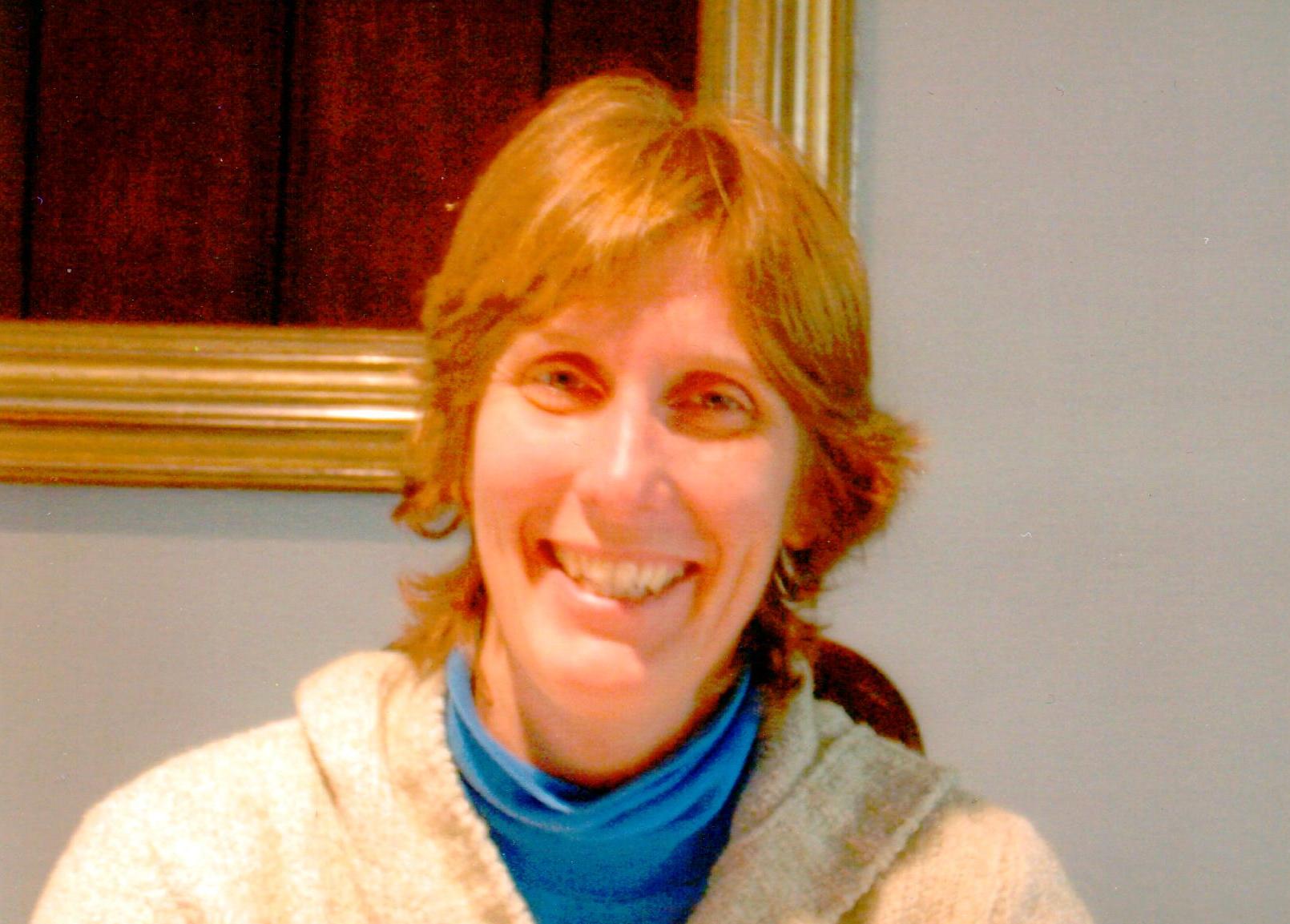
Anna Simons
Photograph by Dorothy Stevens
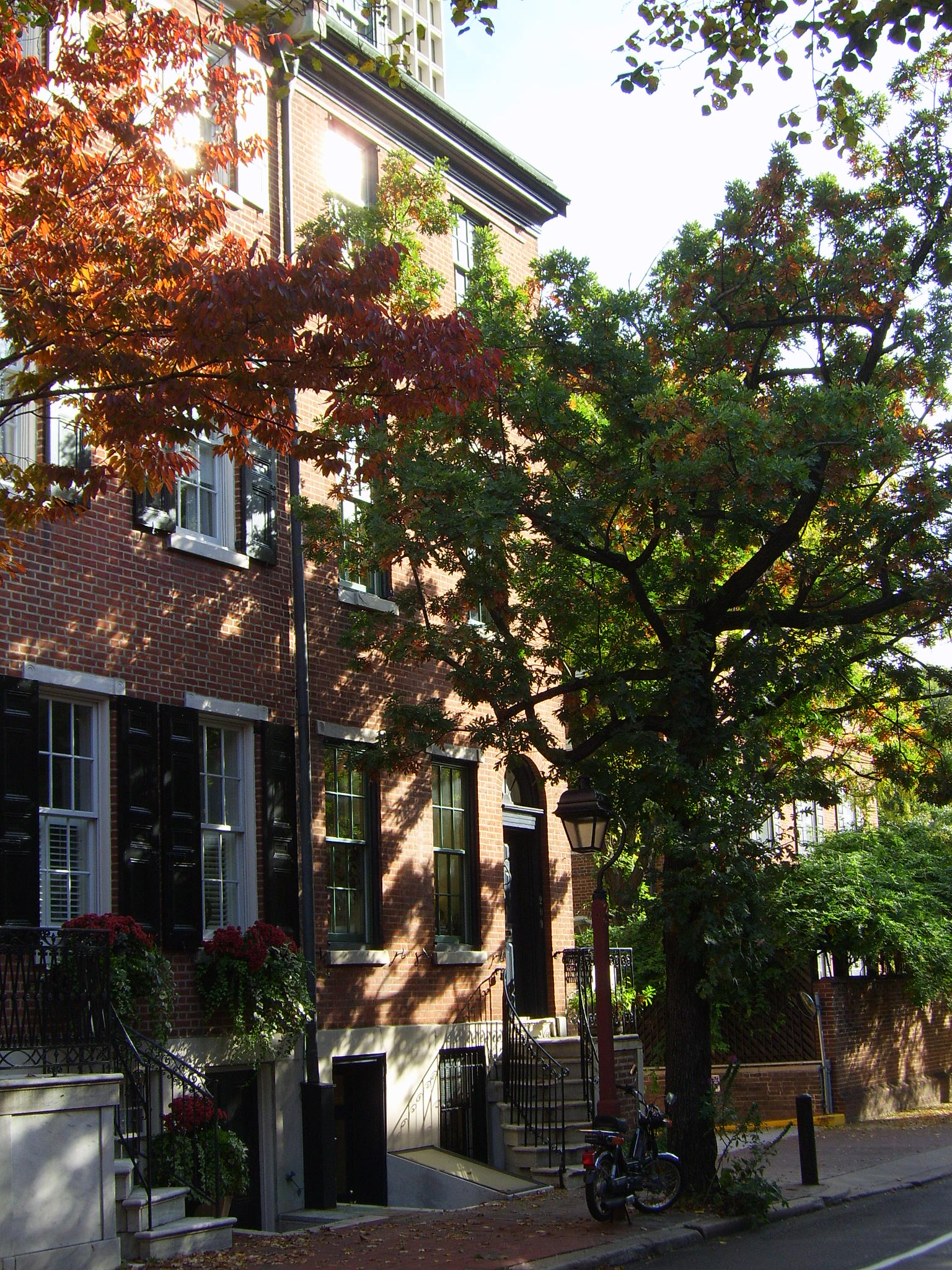
209 Spruce Street
Photograph by Cynthia J. Eiseman
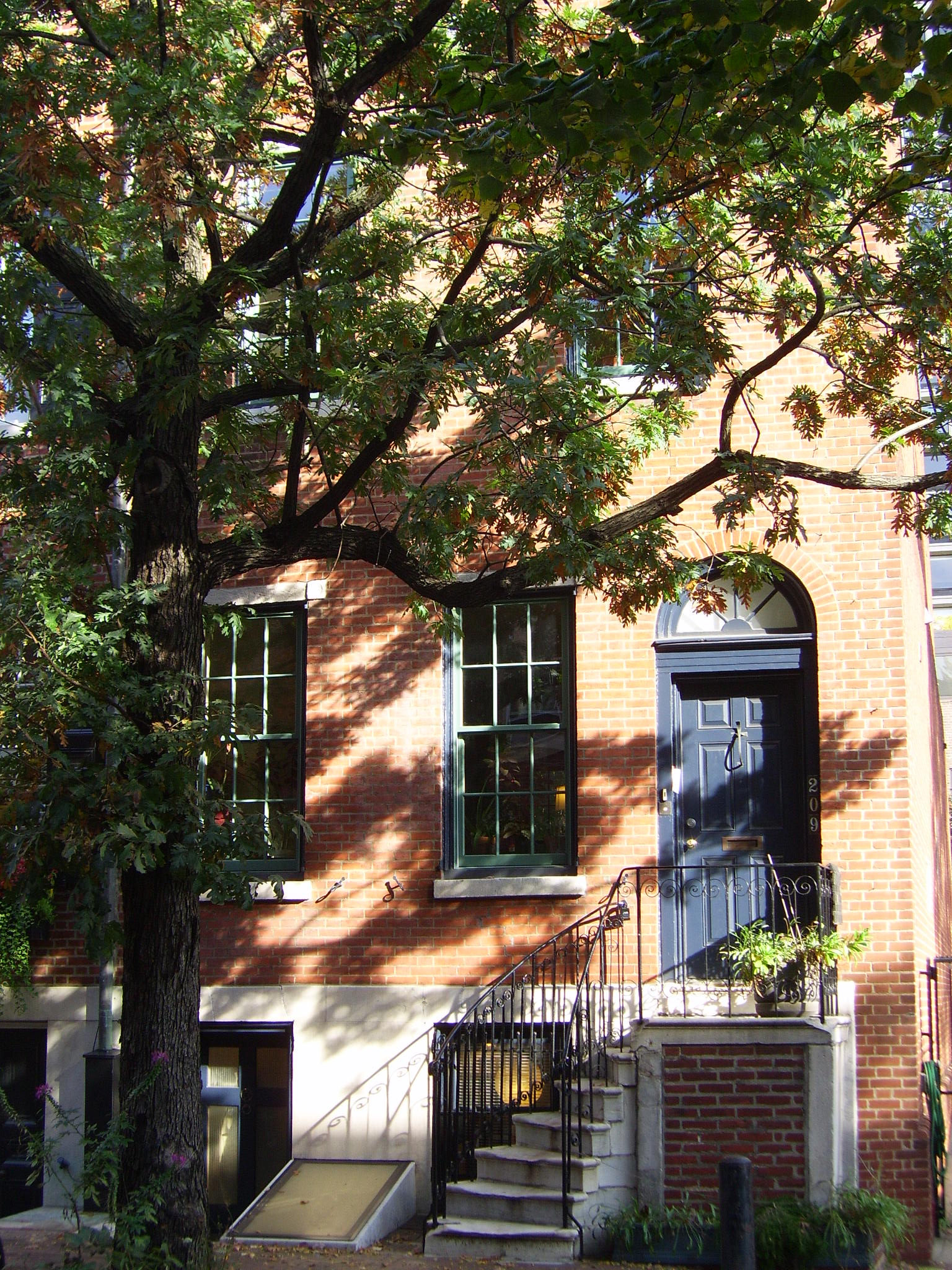
209 Spruce Street
Photograph by Cynthia J. Eiseman
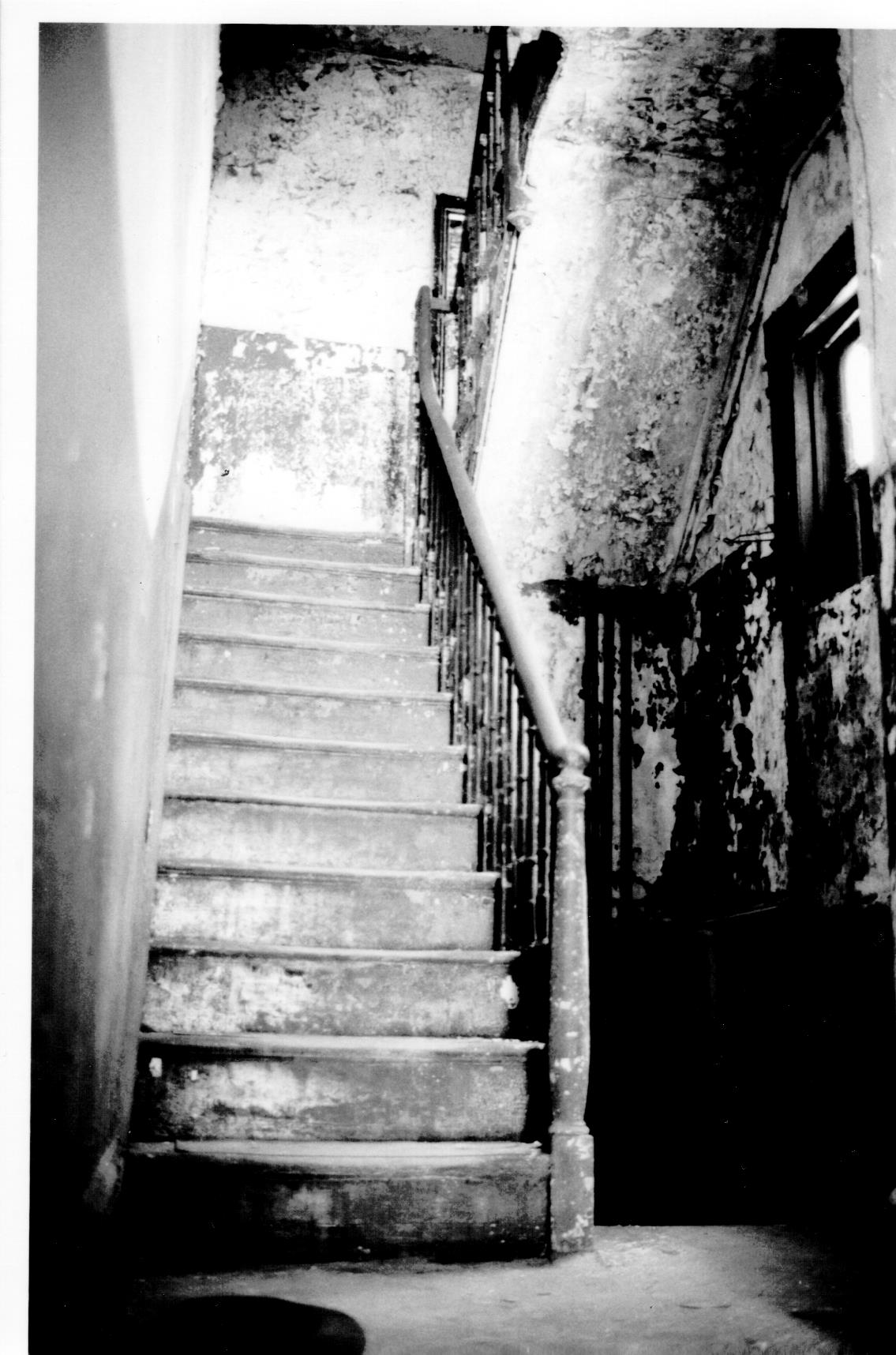
209 Spruce Street - 2nd floor interior stairway
Photograph by Ute Simons
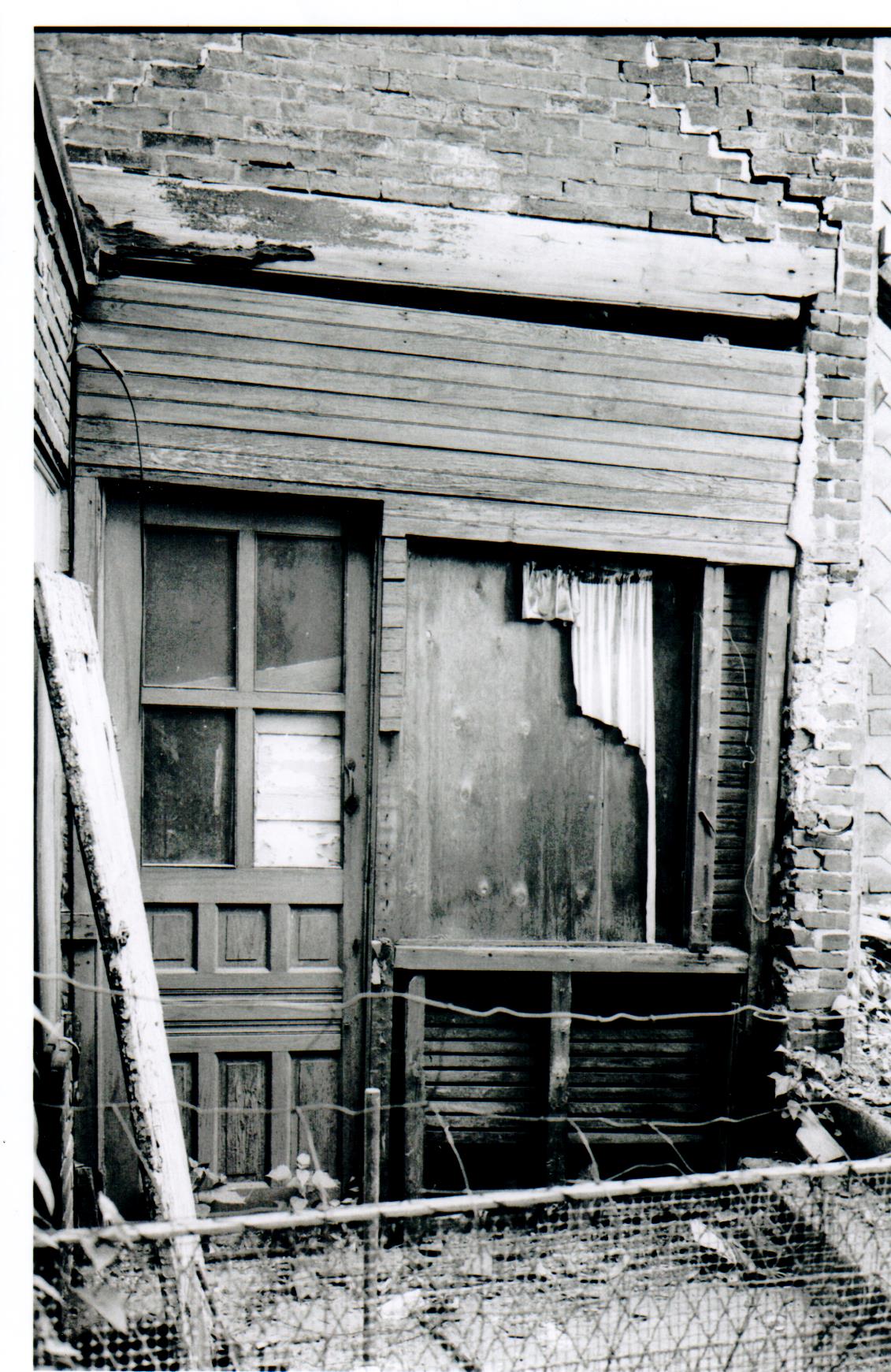
209 Spruce Street - rear door, first floor, before restoration
Photograph by Ute Simons
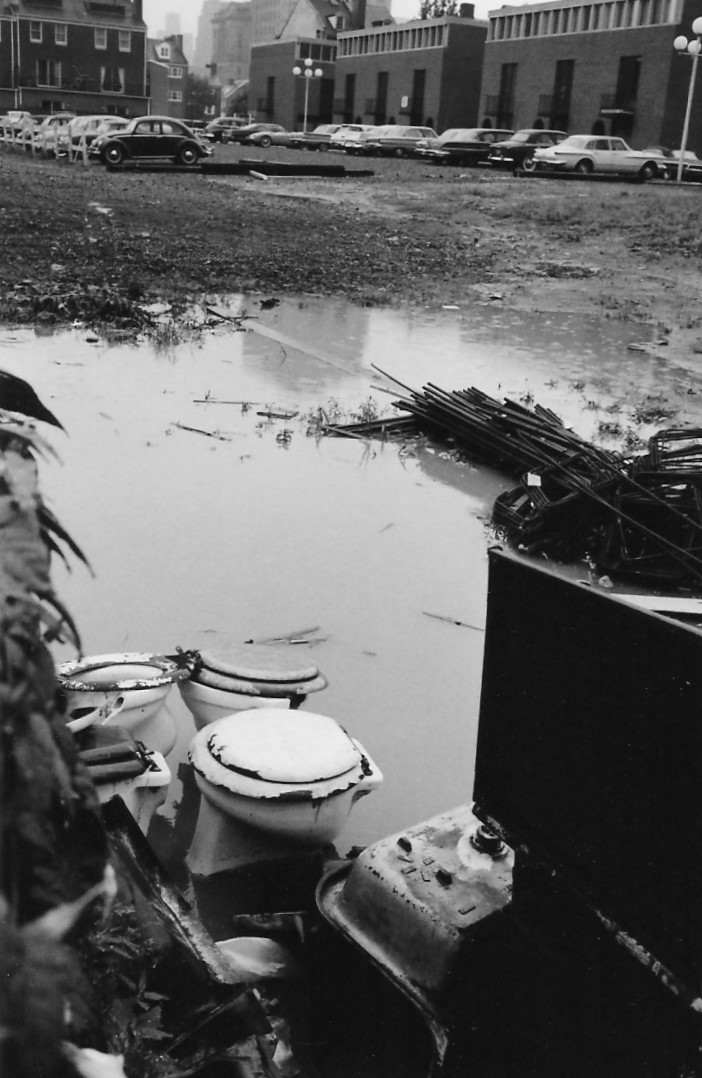
209 Spruce Street - Backyard
Photograph by Ute Simons